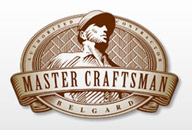Concrete Paving/Pavers
Concrete pavers are produced on specially designed machinery which ensures an exact quality controlled process that produces paving brick of higher strength and durability than poured in-place concrete. Concrete pavers are manufactured as a single homogeneous mix throughout; not a two mix system which has a top coat. Concrete pavers have a minimum average compressive strength of 8,000 psi, compared to poured-in-place concrete with an average of 3,000 psi (almost 3 times stronger), and have a lower absorption rate as well.
Concrete pavers are the ideal product for freeze/thaw environments. With proper installation, this product provides a hard wearing and flexible surface. The joints between the pavement allow the walkway, driveway, or patio to move without cracking. In addition, they can be “unzipped” to allow for repairs or easy access to utilities. Unlike asphalt, pavers are virtually maintenance free and do not need to be regularly sealed or replaced.
Because we take pride in being Broken Arrow / Tulsa landscaping specialists, here are some questions that may help you better understand pavers and how they could work on your property.
FAQ’s
Why are they called “interlocking pavers?
It is the combination of the installation system, together with the ratio between the thickness and the length and width of the paver which makes them “Interlocking” – not the shape. When installed correctly over a base designed and properly prepared for the type of application and load bearing which the installation is intended to carry, the combination of the paver, bedding sand, edge restraint and joint sand causes them to interlock, allowing the individual pieces to work as a unified, flexible pavement.
How does the “interlocking” system work?
Pavers are placed over a leveling course, which is over a compacted aggregate base. The thickness of the base will vary depending on the purpose of the application. The pavers are retained at the outside perimeter of the project using edge restraints. Edge restraints such as plastic edging and concrete curbs are recommended. Once the pavers are placed and restrained, the interlocking process may begin. Coarse, angular sand is swept into the joints and over the pavers. The pavers are compacted and may take 1 or 2 passes before the full interlock can be achieved. After compaction, the project is ready for use. Sweeping and cleaning of the area will be necessary.
How do pavers compare with “Patterned” or “Stamped” concrete?
Patterned concrete pavements are merely large sections of poured-in-place concrete that have been embossed with a design. Therefore, they are prone to the same problem freeze/thaw cycles (ie. cracking and spalling), lower strengths and higher absorption rates as poured-in-place concrete. Pavers permit a flexible, breathable surface, working with nature. In addition, stamped concrete requires expansion joints every 10 feet or so, which can be very distracting. Also, patterned concrete pavements don’t allow access to underground utilities or the ability to make repairs. At practically the same price per square foot installed, pavers are clearly the best choice.
How long will my installation last?
Installed properly, pavers will out perform poured-in-place concrete, stamped concrete and patterned asphalt by many years.
How long will it take for my project to be installed?
Less time than you might think. The average home patio can be installed in a day or two. Being a mortarless system, a lot of extra work and mess are eliminated.
After installation, will weeds grow from underneath my patio or driveway?
Once complete, the installation will not permit seeds to germinate from beneath the pavers. However, weeds and grass could result from seeds or spores blowing into and lodging in the joint sand. We use PREEN brand weed control products to deter weed growth. We also use a polymeric sand, which is a unique mixture of polymer binders and a calibrated sand, available in brown or grey colors. The installation of this polymeric sand is almost identical to using regular paver joint sand, except for the application of water. Once the polymeric sand sets, it becomes very firm and locks between the paver joints. This firm bond maintains pavers securely in place, being equally effective on both horizontal and sloped surfaces. It also withstands erosion due to climatic conditions, such as wind, rain and freezing temperatures.
Will the colors fade from the pavers?
Pavers are made with the highest quality pigment and have color completely throughout each unit. However, the extreme effects of the sun and elements work against all building materials. Over the years, it is possible to see the colors mellow as they age.
Can I add on to my project at a later time?
One great reason for using pavers is because you can easily add to any type of project that you are doing. All you need to do is to take up the existing edge restraint and a few rows of pavers. Prepare the base and setting bed for the new section. As you add the new units, blend the new brick with the old of the existing section. This will help reduce any variance of the existing colors.
Should I seal my project?
Pavers are manufactured to be durable. Therefore, the use of a protective sealant is optional and a matter of personal preference. A sealant will make stain removal easier, might minimize weed germination in the joint sand and can enhance colors. Sealers, however, are a topically applied product and must be reapplied every 2 to 3 years. Sealing pavers may make pavement slippery when wet. Before sealing, the installation must be thoroughly cleaned and completely dry.
What about stains on my installation or any areas that may become damaged?
Stains can be removed with appropriate cleaning products. However, should a severe stain occur or some pieces become damaged, pavers are distinct advantage. Individual pavers can be removed and replaced in these situations.
Can I install pavers over an existing concrete walkway or patio?
While this is not the preferred method, your installation can be laid over top of existing concrete walkways, providing there is not substantial heaving in the existing area. Several other issues need to be addressed. First, the grade will need to be raised by about 3″ (the thickness of the bricks plus bedding sand or bonding agent). This is particularly critical if any doorways are involved. Second, remember that if the existing concrete slab should raise or drop with freeze/thaw conditions, the bricks will do the same.
What is the white film on my bricks and will it go away?
The white film, known as “Efflorescence”, is normal for masonry products and it may appear on the surface of the pavers. It may not occur at all. If it does occur, it is not permanent and will disappear over time. It may appear randomly or only in certain areas. It is a natural occurrence from the cement hydration process. Calcium oxide from the cement reacts with water inside the bricks and forms calcium hydroxide. This seeps to the surface and reacts with the carbon dioxide in the air to form calcium carbonate, a whitish residue. When moisture on the surface evaporates, it becomes visible. It will wash off or wear off over time. If you wish to speed up the natural process, there are cleaners available that are designed to remove efflorescence.
The value of pavers go beyond beauty and home appreciation. All surface structures, especially concrete slabs and asphalt, deteriorate with constant expansion and contraction from temperature changes, the movement of tree roots, and water runoff.
Everything Outdoors of Tulsa offers the flexible surface solution for these problems, installing pavers that are strong, durable, and modular. Each paver has a compression strength of 8000 psi, is virtually unaffected by extreme weather and is ready for traffic immediately. Weight is dispersed over hundreds of individual units.
The result is minimal maintenance costs over an extended life span, saving you thousands of dollars in repairs and giving you an asset that appreciates over time. Call us today at 918-236-9173







